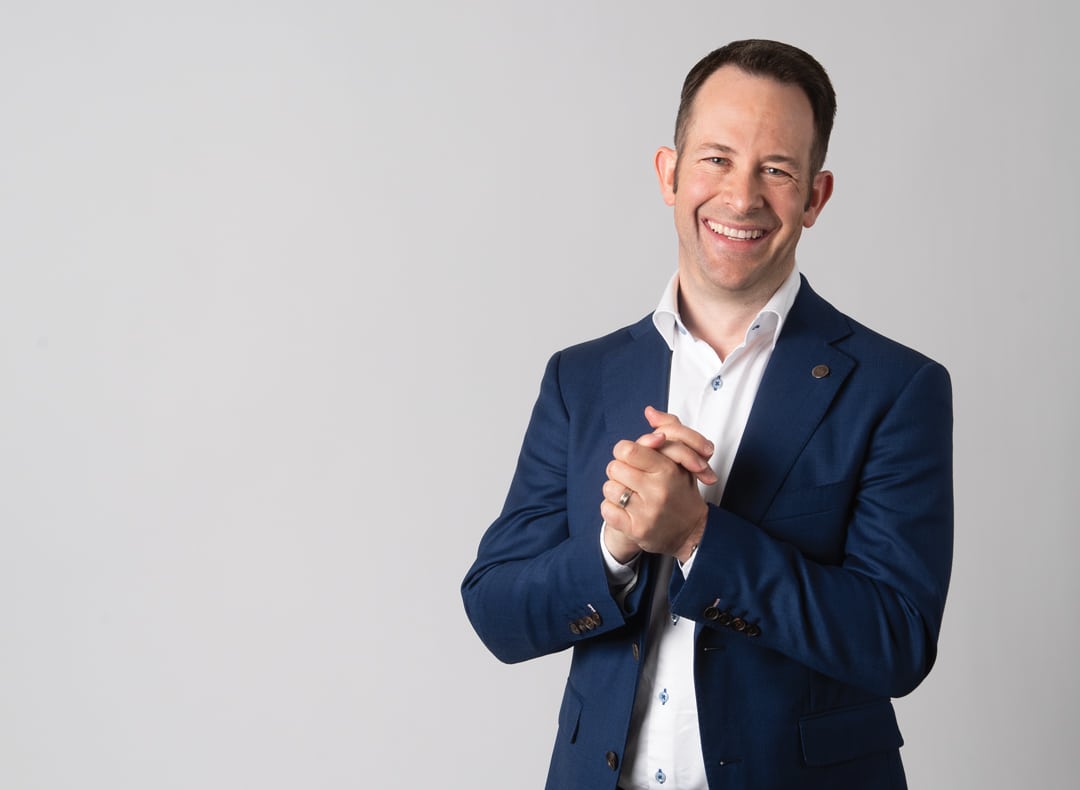Fulfilled by the future
Bâton Global CEO Matthew Mitchell finds purpose in helping communities prepare for what’s ahead
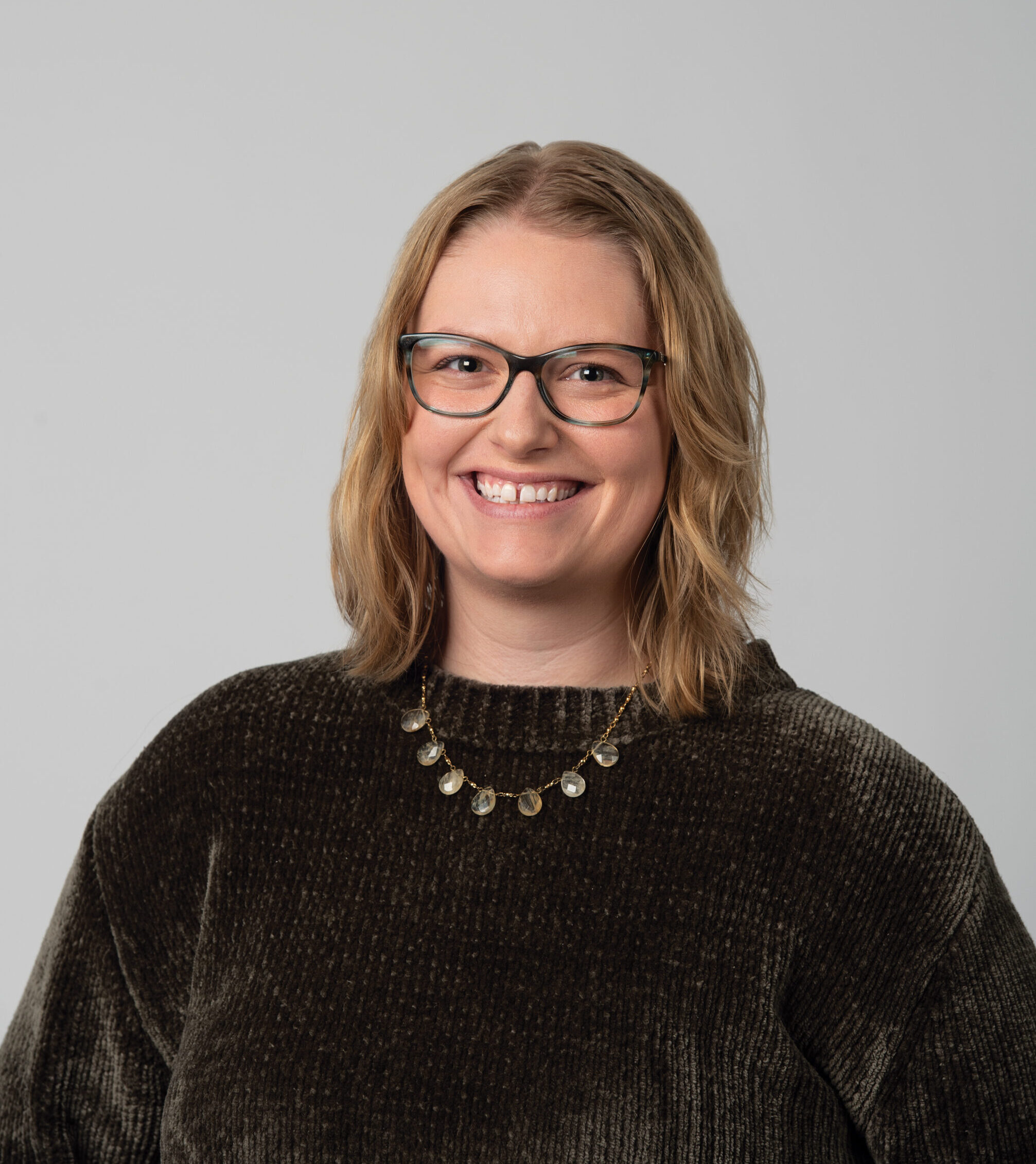
Sarah Diehn Jul 26, 2024 | 6:00 am
6 min read time
1,513 wordsA Closer Look, Economic Development, Innovation and EntrepreneurshipTen years after co-founding Bâton Global with Jeffrey Kappen, Matthew Mitchell has moved into the CEO role as the international strategy consulting firm looks toward its next phase of growth.
A fascination with the future led him to study physics because it explored the concept in the “most macro sense.” But he swiftly learned that it was not the right avenue to express his true interest, so after graduation, he launched a stint of working abroad.
As a computer programmer in London during the dot-com bubble, he was exposed to the need to look into the future to understand and measure risk-taking as a business. The venture he worked for went from a virtual monopoly to going out of business because it did not foresee the disruption of Google and Apple.
That experience was one source of inspiration when starting Bâton Global in 2014. Mitchell said the firm’s mission is to serve the Des Moines community and bolster its institutions by helping companies be risk-astute rather than risk-averse.
“Our culture is an asset and sometimes it can be a real barrier to asking hard questions and making hard decisions, so being risk astute means having the bravery, the courage to look in the mirror at who we are and look into the future who we want to be,” Mitchell said.
Half of that equation is figuring out a strategy by establishing priorities and evaluating what decisions are needed to fulfill them. The other half is coaching leaders and board members in their role in executing the vision and decisions.
The Business Record recently caught up with Mitchell.
This Q&A has been lightly edited for clarity and brevity.
Can you share about why and how your role at Bâton has changed?
We started Bâton with two partners and we have managed the firm with different partners over the years, and we decided for the first 10 years to manage it collaboratively and we still do. Even with my role as CEO, we still run and work collaboratively as partners and as a team. My role has changed just because we wanted to be able to tell our story more clearly. This role really does allow us to present a very unified message to the market. We’re growing. We found great strength managing collaboratively, and for this next phase of our growth, we realized that we just had a greater need to present a unified message to the market. That’s my role — to communicate with clients, with the communities.
Where does your passion for the Des Moines community stem from?
I studied physics, then I never wanted to do physics ever again in my entire life. I bought a one-way ticket east and when I was working in London, I saw 800 developers from 40 different linguistic heritages working on a product that’s going to change the world. I thought, how do people from different walks of life come together to create amazing things? That inspired my professional research on a very simple question: What is the appropriate relationship between business and society? I interviewed about 100 executives and religious leaders from Israel, Egypt, Palestine, Sweden, the United States and also throughout East Asia. They shared that business is fundamentally a creative act. It offers goods, services, employment, dignity, and time and time again, the religious leaders said business is a fundamentally creative act and God is a fundamentally creative act. The role of community, culture, maybe even religion, is to affirm the positive aspects of business that are fundamentally creative and moderate the rapacious, greedy, destructive aspects of business. When I came back from around the world and located in Des Moines, it was a distinct choice because this community understands that we have a lot of different contributors, a lot of different stakeholders, and this unique leadership culture that’s in Central Iowa, it’s special. Compared to New York which is more of a hand’s length transaction and it’s just business, and the same thing on the West Coast, we are distinct because we focus on our mutual commitment to one another over the long term. That’s why I chose this community and that’s why I choose to stay here.
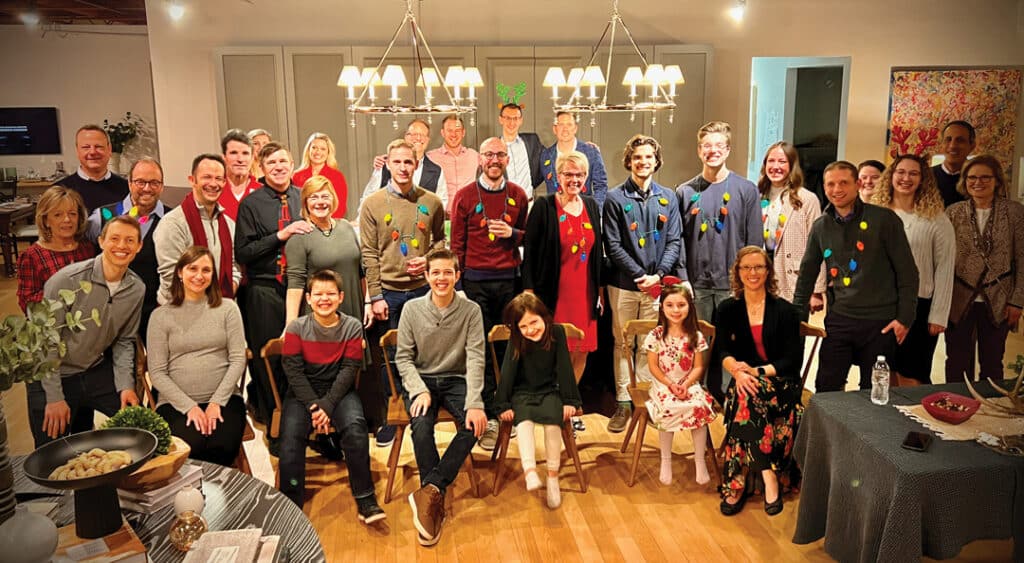
The Bâton Global team at an annual holiday party. Submitted photo
Bâton Global is a partner in both the Downtown DSM: Future Forward plan and the regional Capital Crossroads strategy. How do these strategies with plans for broad impact turn into visible action?
I had a mentor tell me that his favorite definition of strategy is that it’s just a sustainable conversation. And when you have a community that’s willing to show up and contribute, ultimately, over time, that sustainable conversation yields specific action that culminates in collective action and impact in huge ways. One big element is also the boldness and leadership to put forth a vision. Leadership and strategy abhors a vacuum. Without a compelling vision, you don’t know where you’re going. The leadership to step into that vacuum and help create a vision, that’s got to be the greatest action that creates impact over time, but there’s a lot of other things. You can’t be stubborn when you’re part of a multi-faceted community. You have to compromise. I think if I were to give a gift to this community and even to others, it’s that “no now” does not mean “no forever,” and if your issue isn’t at the top of the list right now, what is at the top of the list of the community and how do we cooperate?
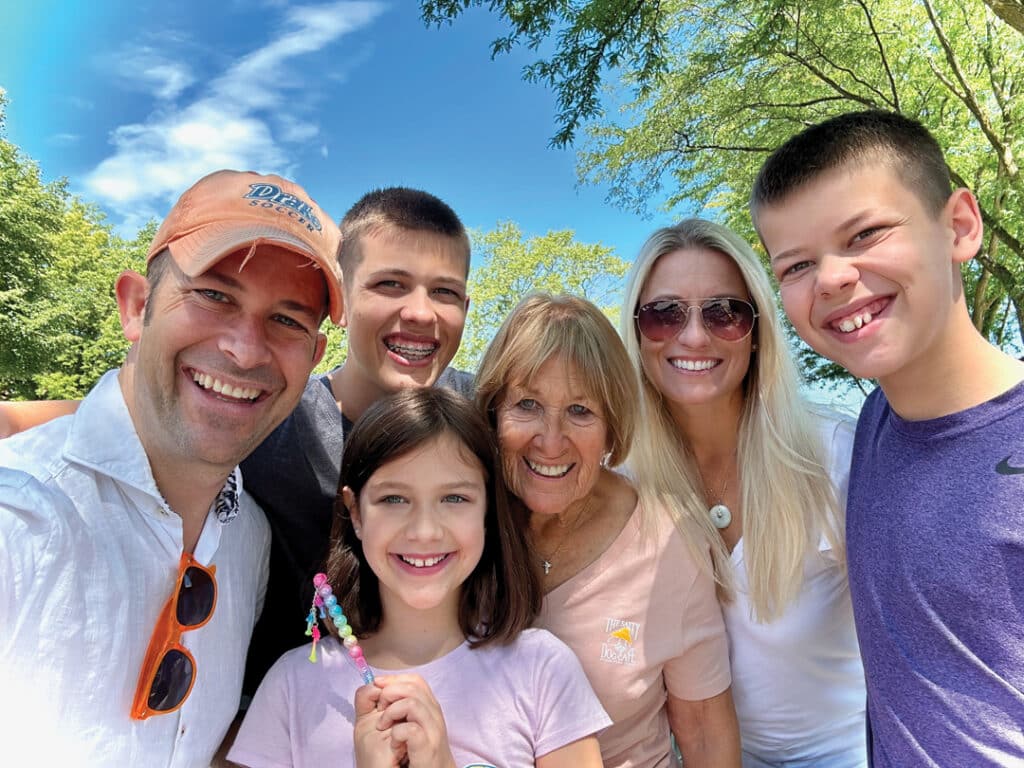
How has serving as a professor in Drake’s business school helped inform your professional work?
When I came back from working around the world, I needed a job. I said I never wanted to do physics again in my entire life, and I became a high school physics teacher. I love that story because I understood what they were going through, the challenge. To be an amazing teacher, you have to forget everything you know. You have to bring great empathy. You have to understand where they are in their lives, but also outside the bounds of your specific content area. Making physics interesting to 40 teenagers every day, seven times a day, I like to say, was perfect preparation for any board meeting or executive strategy retreat today 25 years later. My mother was a teacher for 45 years, so that is my identity. It’s my passion. When I came to Drake 15 years ago it was just the fulfillment of a dream to contribute to students’ lives and success. I teach undergraduates, graduates and executive education, so it’s a unique perspective to see the full span of students from ages 18 to 88.
You mentioned a time when your ideas about balancing life and work changed. Can you share more about that?
It’s always been important, but in 2022, I had the opportunity to work with my partner at Bâton Jeff Kappen and Tony Thelen to write a book called, “Am I Doing This Right?” We asked a thousand leaders around the world: What’s the biggest piece of advice they ever received? And the biggest regret they’ve had in their lives? One of the biggest themes that emerged from that were these very personal, very authentic, sometimes very heart-wrenching stories of leaders who regretted working as much as they did. If given the chance, they would go back and balance their work and their life a little bit better. That’s the message that they shared with us. Me and all of our co-authors felt compelled to share that with others. That means now, what do I do with that? In our family, just like in a community, we have to work together and collaborate, clearly communicate, compromise. My wife was a commercial real estate appraiser, working while I was in school. Now, that balance of work has shifted, and she has chosen to take care of our kids and volunteer like a madwoman in the community. I love that our relationship and our compromise enable her to be most effective at what fills her bucket and me to have a role in a different way, in the classroom, in the community and with clients. It’s really important where you spend your time. If you want to look where your values are, look at how you spend your time.
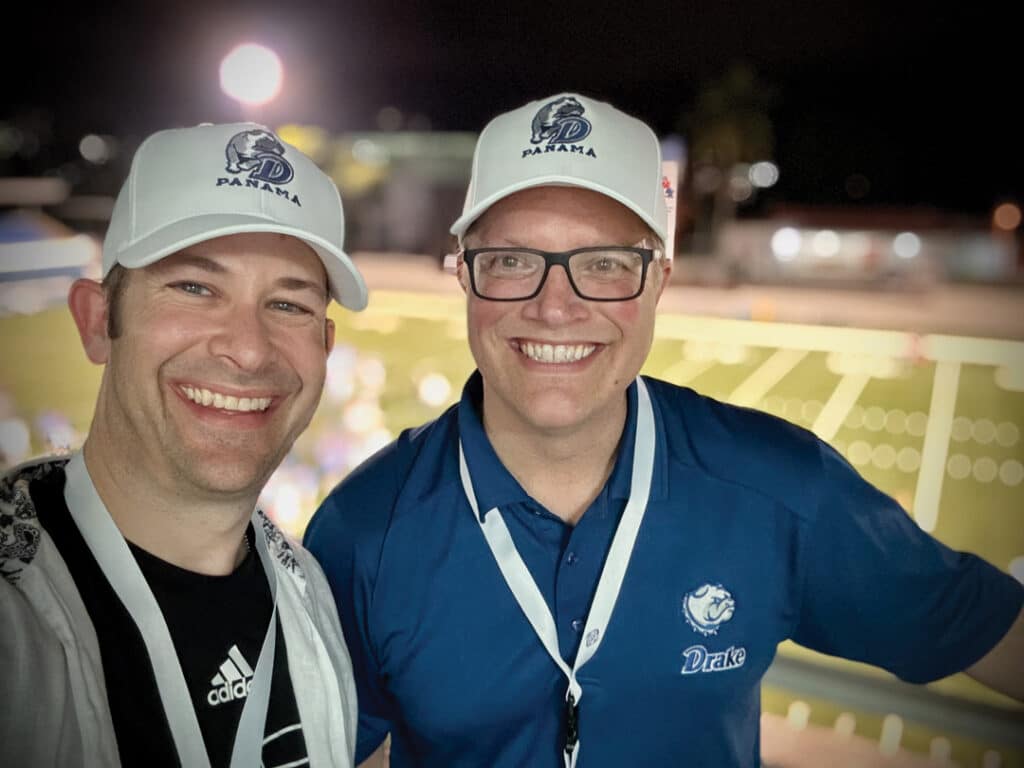
Mitchell and Bâton Global co-founder Jeffrey Kappen.
Submitted photo
What is Bâton Global focused on looking ahead?
We are growing and that’s exciting. We’re growing in Des Moines. We’re continuing to fulfill that original mission of serving insurance, financial services and manufacturing. We’re also growing in service to communities. We have clients in California, clients on the East Coast, West Coast. But a lot of current growth is working with chambers in Michigan, Nebraska, Kansas, Des Moines and Florida. We’ve really developed a unique offering to help chambers of commerce and economic development organizations make those hard trade-off decisions.

Sarah Diehn
Sarah Diehn is editor at Business Record. She covers innovation and entrepreneurship, manufacturing, insurance, and energy.

